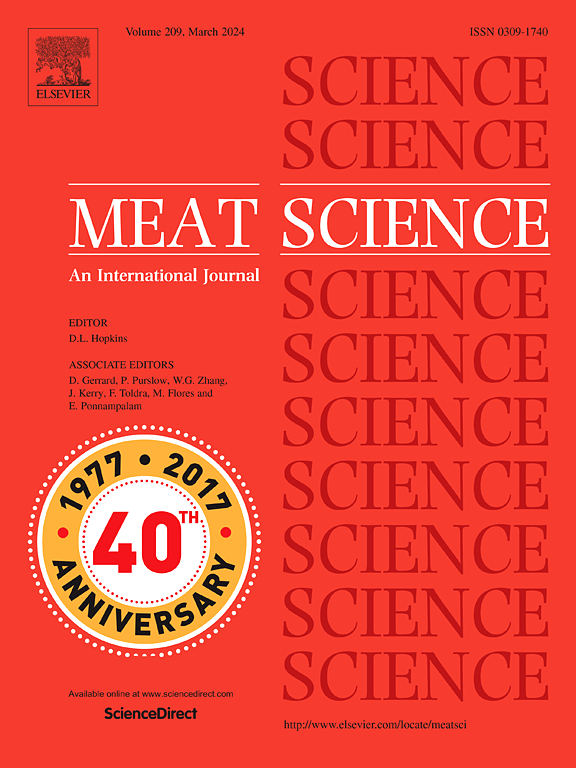肌肉生长抑制素编辑和肠道菌群调节能产生更多更美味的肉吗?
IF 6.1
1区 农林科学
Q1 Agricultural and Biological Sciences
引用次数: 0
摘要
随着全球人口的增长和经济的发展,人们对肉质和风味的需求不断增加。虽然集约化养殖以及营养和管理实践的进步推动了肉类生产的显著改善,但仍需要可持续的解决方案来进一步提高肉类产量和质量。肌生长抑制素(MSTN)基因作为肌肉生长和分化的抑制剂,已被广泛研究。抑制MSTN活性已被证明可诱导多种动物的肌肉增生和/或肥大,导致骨骼肌质量增加。然而,缺乏MSTN也会减少脂肪量,这会对肉的风味和品质产生负面影响。除了基因调控外,肠道微生物群在肌肉发育和脂肪积累中起着至关重要的作用。新出现的证据表明,肠道微生物群和宿主之间存在复杂的相互作用,这可能会影响肉类的生产和质量。有趣的是,mstn修饰的动物可能表现出肠道微生物群的改变,这表明操纵肠道微生物群以提高肉品质的潜力。因此,整合这些见解对于满足消费者对高品质肉类日益增长的需求,同时确保可持续的生产实践至关重要。这篇综述旨在全面概述MSTN对肌肉质量和脂肪积累的影响,以及在农场动物中使用基因编辑来增加肉量的机遇和挑战。此外,它强调了肠道菌群在调节肌肉生长和脂肪沉积中的重要性,强调了肠道菌群调节改善肉类品质的潜力。本文章由计算机程序翻译,如有差异,请以英文原文为准。
Can myostatin editing together with gut microbiota modulation produce more and tastier meat?
The growing global population and economic development have increased the demand for meat with desired texture and flavor requirements. While intensive breeding and advancements in nutrition and management practices have driven significant improvements in meat production, sustainable solutions are still needed to further enhance both meat yield and quality. The Myostatin (MSTN) gene, which acts as an inhibitor of muscle growth and differentiation, has been extensively studied. Suppressing MSTN activity has been shown to induce muscle hyperplasia and/or hypertrophy in various animal species, resulting in increased skeletal muscle mass. However, MSTN deficiency also decreases fat mass, which can negatively impact meat flavor and quality. In addition to genetic regulation, the gut microbiome plays a crucial role in muscle development and fat accumulation. Emerging evidence suggests a complex interplay between the gut microbiota and the host, which may influence meat production and quality. Interestingly, MSTN-modified animals may exhibit altered gut microbiota, indicating the potential to manipulate gut microbiota to increase meat quality. Thus, integrating these insights is crucial to satisfy the growing consumer demand for high-quality meat while ensuring sustainable production practices. This review aims to provide a comprehensive overview of the effect of MSTN on muscle mass and fat accumulation, as well as the opportunities and challenges associated with using gene editing in farm animals to enhance meat quantity. Moreover, it emphasizes the importance of the gut microbiota in modulating muscle growth and fat deposition, highlighting the potential for gut microbiota manipulation to improve meat quality.
求助全文
通过发布文献求助,成功后即可免费获取论文全文。
去求助
来源期刊

Meat Science
工程技术-食品科技
CiteScore
12.60
自引率
9.90%
发文量
282
审稿时长
60 days
期刊介绍:
The aim of Meat Science is to serve as a suitable platform for the dissemination of interdisciplinary and international knowledge on all factors influencing the properties of meat. While the journal primarily focuses on the flesh of mammals, contributions related to poultry will be considered if they enhance the overall understanding of the relationship between muscle nature and meat quality post mortem. Additionally, papers on large birds (e.g., emus, ostriches) as well as wild-captured mammals and crocodiles will be welcomed.
 求助内容:
求助内容: 应助结果提醒方式:
应助结果提醒方式:


